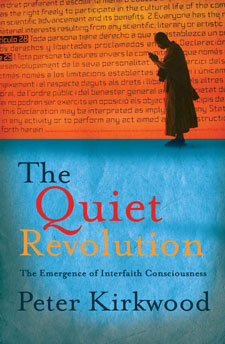The subtitle to this adaptation of an ABC Compass series titled The Quiet Revolution is "The Emergence of Interfaith Consciousness'.
In hindsight I found it to be a misleading subtitle. Not that I can easily put into words what I was expecting, but I definitely wasn't expecting what basically functioned as an apologetic for pluralism.
 The first three chapters of the book highlight case studies of individuals, communities and international organisations that are all involved in the promotion of "Interfaith' work.
The first three chapters of the book highlight case studies of individuals, communities and international organisations that are all involved in the promotion of "Interfaith' work.
The term "Interfaith', in this work, seems to really be an expression of a form of syncretism, which is the amalgamation of different religious concepts. In saying this I must acknowledge that the book makes attempts to deny such a claim.
I found this first section of the book particularly clunky. The thoughts and ideas seemed jumbled with no clear structure and I was often unsure as to whether I was reading Kirkwood's description of the individual, community or organisation, or whether I was reading their own statements on the idea of religion and interfaith work. Regardless, I sometimes found the quotes themselves bordering on being unintelligible with their complex, post-modern jargon.
The second grouping of three chapters, entitled "One World Religion', "One Truth or Many Truths?' and "Fundamentalism' were a little more coherent in how the ideas were expressed, but once again I found myself scratching my head trying to understand some of their principles.
The key philosophy lying behind this book, which is explained particularly in these last three chapters, is what's commonly described in the metaphor of "there being many paths to the top of the hill'. This teaching promotes the idea of acceptance in the diversity of religions, and their ability to enable one to "participate in the divine'. Those involved in the interfaith movement, according to this book, aren't interested in the establishment of one world religion, but rather the universal acceptance between religions of one another in accomplishing the same goal.
The last chapter on Fundamentalism left me lost for words. The entire book was full of assertions that were backed up with little more than fluff, but this chapter was particularly bad. Considering the principle of religious understanding this book promotes, this chapter was almost entirely ignorant of fact or detail. For the most part it painted a caricature of people who disagree with pluralism in favour of an exclusive means of understanding God, be it Christianity or otherwise, as fearful, militant, uneducated reactionaries.
As an orthodox, bible-believing Christian I found this book a hard slog to read, if you hadn't picked that up already.
There are three issues in this book that I'd like to specifically address:
1. The claim that all religions have a common goal
John Dickson's book A Spectator's Guide to World Religions must be commended for the way in which it approaches today's religious diversity. At multiple points within the introductory chapters to this book, John points out that it's important to not apply categories from one train of religious thought to another, as they don't all essentially have the same goal in mind. This is fundamentally ignored by pluralism.
2. The use of the ambiguous term of "The Divine'
There are many parts of this book that I have issues with, but strangely enough I feel this is one of the more important. This use of this term detracts from the truth that God is the only god, that He is sovereign, that He is personal, and that He is worthy of honour. (Psalm 96)
3. The suppression of the truth about Christ
Following on from the previous point, in teaching a philosophy of pluralism, the truth about Christ is being suppressed. Jesus himself taught "I am the way and the truth and the life. No one comes to the Father except through me." (John 14:6) It is only through Jesus, and his atoning sacrifice on the cross, that people may be forgiven for sins and reconciled to God. This idea doesn't factor into any of the thinking in this book.
My personal opinion is that the book was essentially not worth reading, though learning a little more about the underlying ideas behind pluralism may have been helpful. This could easily be achieved through reading alternative literature.





















